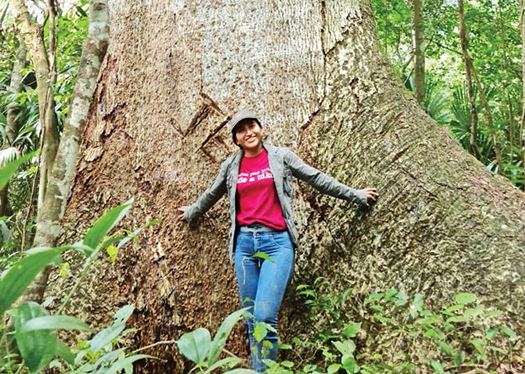
Mayra Pop (above) is completing work on a forest-engineering degree with help from Fundaeco, which offers girls and women workshops and health services (in the index). (Photo courtesy of Fundaeco)
A Guatemalan environmental nonprofit believes that empowering women and girls, especially those living in remote areas of high conservation value, can also improve biodiversity and climate protection.
The nonprofit, Fundaeco, is pursuing that vision through its Healthy and Empowered Women and Girls Program, which it launched in 2008. The program offers women and girls better access to education, preventive health services, jobs and other opportunities.
“When I was 14 years old, a boy’s parents asked for my hand in marriage,” says Mayra Pop, a Maya Q’eqchi’ from the village of Aldea Chinacadenas, in Guatemala’s Izabal department.
Mayra did not marry. She had begun participating in Fundaeco workshops in 2015. When the boy proposed in 2017 and her father tried to give her away in marriage, she filed suit with Fundaeco’s help, asserting her human right to instead pursue her education and ultimately winning the groundbreaking case. She continued her studies to the university level and is now completing a degree in forest engineering.
“That was seven years ago,” says Pop, who also is working as a community youth leader. “By now I would have at least three children, as many of my school peers do, and I would have been a housewife from the age of 14.”
Young mothers
It is still common for rural Guatamalan girls to quit school young and start families. From January to August of 2023, Guatemala registered 1,589 births to mothers aged 10 to 14, and 41,742 births to mothers aged 15 to 19, says Guatemala’s National Registry of Persons (Renap). Unicef reports that the country’s adolescent birth rates in 2011, the latest year for which figures are available, stood at 92 per 1,000 girls aged 15 to 19, a level comparable to those found in sub-Saharan African countries.
Fundaeco focuses on communities in and around 26 Guatemalan protected areas. Unlike most green groups, it pursues social and environmental goals simultaneously in its work with community members, whom it considers critical to the long-term future of the protected lands.
“The origin of our program was the realization that if access to health services did not improve, women were never going to have the time and energy to dedicate to environmental issues because their reproductive role demands so much of them,” says Karen Dubois, Director of the Healthy and Empowered Women and Girls Program for Fundaeco.
Dubois notes that government health services are practically nonexistent in many remote rural areas. Indigenous women rely on local midwives for reproductive health, and these traditional healers often handle many other medical issues. The Guatemalan health system certifies midwives and visits them once a year, but otherwise offers no additional infrastructure, training or supplies in isolated communities.
Fundaeco established its first three health clinics in Guatemala’s Caribbean region in 2010. It now has 42 in rural areas of conservation interest in the departments of Izabal, Huehuetenango, Quiché and Petén. Together with two mobile clinics and 13 medicine dispensaries, these efforts have improved access to reproductive health services for over 100,000 people. The organization’s workshops address various aspects of women’s health. Among them are basic, prenatal, delivery and postpartum medical care; sexual and reproductive health; first aid; health registration; malnutrition among girls and pregnant women; personal hygiene; sustainability; and biosecurity.
Informational role
“We have an alliance with the ministry of education, which treats the subject of sexual and reproductive health as taboo,” says Dubois, who has helped develop a culturally relevant model aimed at helping to meet girls’ and women’s health needs in their local language. “So we developed courses in the communities to cover this key, yet forgotten area of basic health.”
Over 15,000 people have participated in Fundaeco women’s-empowerment-program talks and training on human rights and sexual reproductive health, topics rarely—if ever—addressed in conventional school curricula. The organization also is filling a curriculum gap in environmental education. Fundaeco helps educate boys and men as well, but focuses mainly on girls and women—which make up 70% of participants—to help offset gender disparities in access to education and services.
“The courses we offer have strengthened our ties to the communities,” Dubois says. “We have gained their confidence. And by improving access to health services, women are better able to engage in activities such as conservation.”
One way this has occurred concerns legal land rights, which Indigenous communities often have trouble establishing despite living in ancestral territories. With improved health services, legal help, and learning in such subjects as human rights and sustainable forestry, they are better equipped to file land claims and to pursue activities such as agroforestry.
Such resources clearly are making a difference for Mayra Pop, now 22. “My dream is to work in conservation by helping communities because nature is so important,” she says.
- Lara Rodríguez
Information on Fundaeco’s Healthy and Empowered Women and Girls Program: link